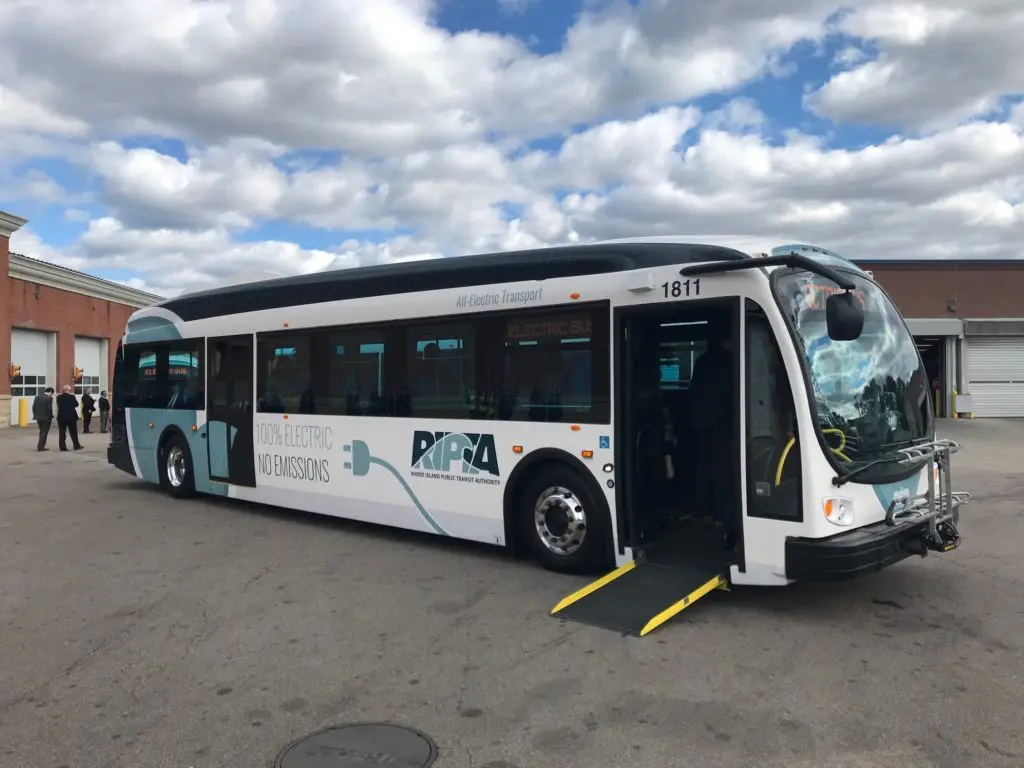Charging Ahead with Electric Buses in Rhode Island
Rhode Island and its Northeast neighbors have achieved great reductions in greenhouse gas emissions from power plants since joining the Regional Greenhouse Gas Initiative (RGGI) in 2009. Unfortunately, emissions from transportation sources are not covered by RGGI and still comprise about 40% of all greenhouse gas emissions in the state. Rhode Island needs to act urgently to reduce emissions from passenger, commercial, and public transportation fleets.
Rhode Island has taken an exciting stride towards cleaner public transportation by leasing three 100% electric buses, slated to enter service in early 2019. The Rhode Island Public Transit Authority (RIPTA) showcased the three 40’ vehicles at an October 22nd test drive featuring Governor Gina Raimondo, the state’s congressional delegation, and a contingent of state and local officials. Unlike Providence’s electric trolley-buses from the 1930s to 1950s, which were powered by fixed overhead wires, these battery-powered buses will charge overnight at RIPTA’s bus depot and can be flexibly used on a variety of routes.

RIPTA is using funds from Rhode Island’s $14.4 million share of a massive settlement between the federal government and Volkswagen after the automaker was caught circumventing emissions rules. The state has committed nearly $11 million to purchase 16 to 20 additional all-electric buses in 2021. Each electric bus that replaces an older, high polluting diesel bus could reduce carbon dioxide (CO2) tailpipe emissions by nearly 230,000 pounds annually, according to bus manufacturer Proterra.
In addition to reducing CO2 emissions, each diesel-to-electric bus replacement would also avoid over 100 pounds of nitrogen oxide (NOx) tailpipe emissions, which can cause or worsen respiratory and heart diseases in local communities. RIPTA will prioritize deploying electric buses on routes that serve low-income, environmental justice communities in neighborhoods that disproportionately bear the negative health impacts associated with fossil fuel combustion. This approach to prioritizing health benefits in overburdened communities should serve as a model for future clean transportation investments in Rhode Island and the region.
While the upfront cost of electric buses is higher than existing diesel, diesel-electric hybrid, or compressed natural gas (CNG) equipment, RIPTA expects to achieve significant life cycle savings primarily through lower fueling and maintenance costs—electric vehicles have fewer drivetrain components and feature regenerative braking, which can greatly reduce the overall frequency and cost of parts replacement. Still, as transit agencies across the country seek to incorporate cleaner vehicles, the upfront premium on electric bus purchases will likely remain a significant barrier.
One way to generate a dedicated revenue stream for clean transportation investments is through a price on carbon emissions from the transportation sector. A group of dedicated states, including Rhode Island, has been exploring policy solutions through the Transportation & Climate Initiative. Acadia Center released a policy analysis in September detailing how enacting a $15 per metric ton price on carbon emissions from the transportation sector could help Rhode Island generate over $600 million in revenues between 2019 and 2030 for a variety of clean transportation investments. This could include vehicle electrification, improved commuter rail offerings, cleaner port operations, and expanded pedestrian and bicycle paths to connect more people to employment, recreation, and basic services in their communities.
Acadia Center will continue to advocate for programs that address transportation-related emissions, helping states pursue and expand new opportunities for investment in clean transportation programs. Click here to read more about Rhode Island’s clean transportation opportunities.


















